Trump's hush-money sentencing will still happen in September despite his new immunity superpowers, New York legal experts predict

- Oops!Something went wrong.Please try again later.
Trump wants his hush-money verdict nixed in the wake of the Supreme Court immunity opinion.
But Trump's new immunity superpowers won't derail his September sentencing, experts predict.
That's because any official-act evidence used in his trial only amounts to "harmless error."
"No harm, no foul" isn't just for streetball. It could help former President Donald Trump's hush-money conviction survive the US Supreme Court immunity opinion.
Thanks to a legal doctrine called "harmless error," Trump's September 18 sentencing is virtually guaranteed to proceed as planned, former New York judges and prosecutors predicted in conversations with Business Insider.
And no amount of jumping up and down and screaming "SCOTUS" can stop it, they said.
That's because even if Trump's trial judge, New York Supreme Court Justice Juan Merchan, finds that presidential immunity retroactively invalidates some evidence used at trial, he'll likely also find that this amounts to "harmless error."
No harm, no foul — meaning that even if you removed the challenged evidence, there would still be overwhelming proof of Trump's guilt.
"Saying it's harmless means you're saying that removing this evidence from the trial wouldn't change the verdict," explained John Moscow, a former Manhattan financial crimes prosecutor.
"And yes, I believe the judge will find that he would have been convicted regardless," added Mocow, now senior counsel at Lewis Baach Kaufmann Middlemiss in New York.
"And yes, I believe that the judge will find that this was harmless."
What are Trump's lawyers trying to do?
Trump's lawyers are about to file what's known as a 330.30 motion to set aside the verdict. Their deadline for filing is Wednesday.
It's a pre-sentencing motion. And it's based on a state statute that tells New York criminal trial judges that they must toss out a verdict if the defense proves that something happened in the trial that was so grievously wrong, it would never survive an appeal.
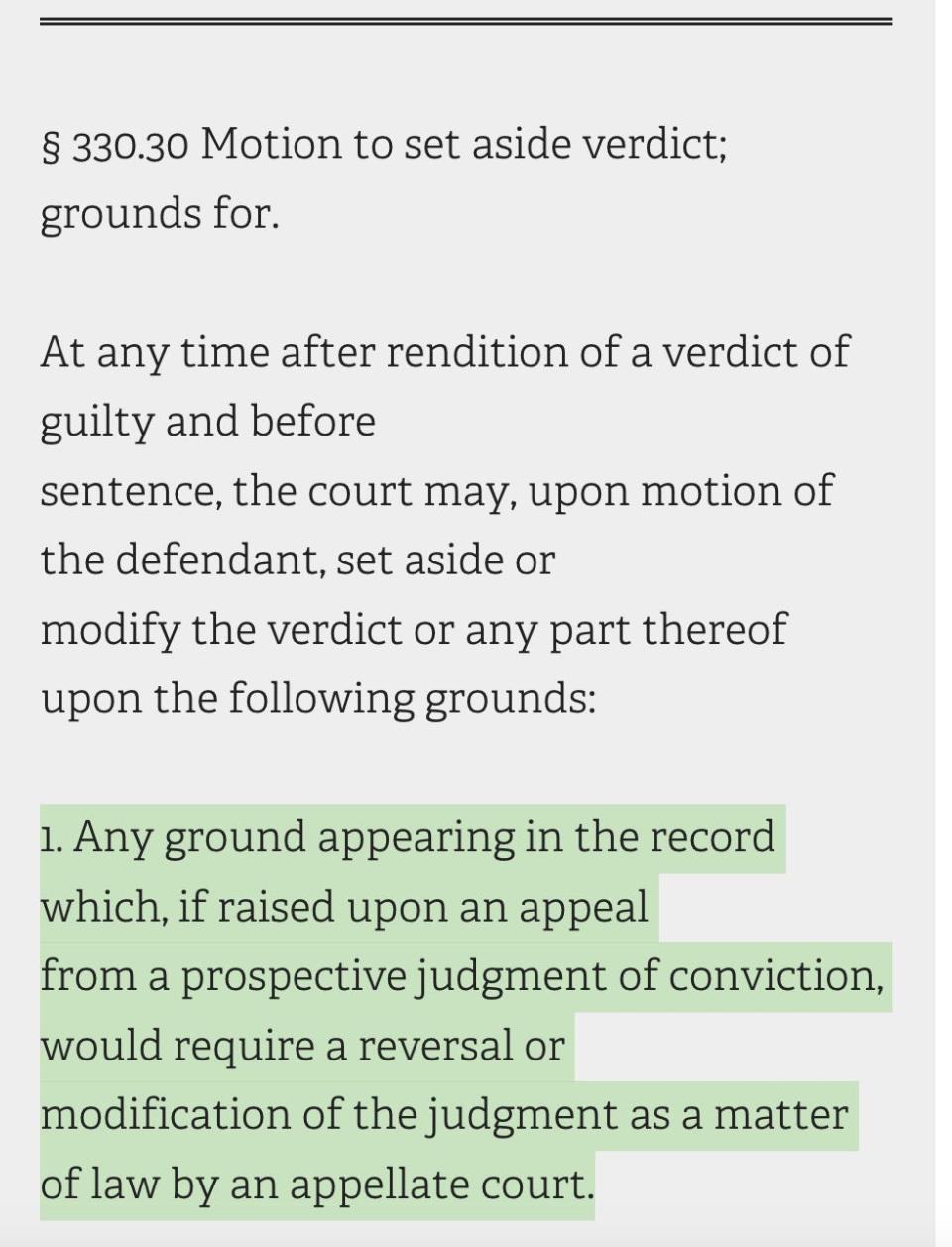
And here's where SCOTUS comes in
Trump's lawyers have already given Merchan and prosecutors the broad outlines of what they believe those grievous 330.30 grounds for an appellate reversal are.
They're the same grounds they raised pre-trial in March, in arguing without success that the trial should be delayed until SCOTUS addressed presidential immunity.
Monday's immunity opinion protects former presidents from having to defend themselves against evidence involving their "official acts."
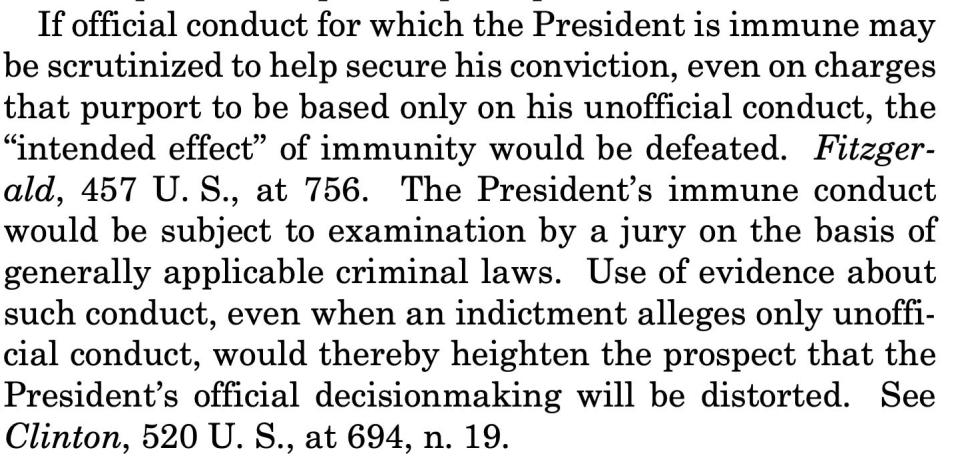
Trump's lawyers now say there were at least four times that the judge improperly let Manhattan prosecutors show official-act evidence to the jury.
All four instances involved evidence from 2017 and early 2018. (It was just 11 days before the 2016 election when then-Trump attorney Michael Cohen fronted $130,000 in hush money to porn star Stormy Daniels. But Trump was in the White House when he falsified Trump Organization records throughout 2017 to hide paying Cohen back.)
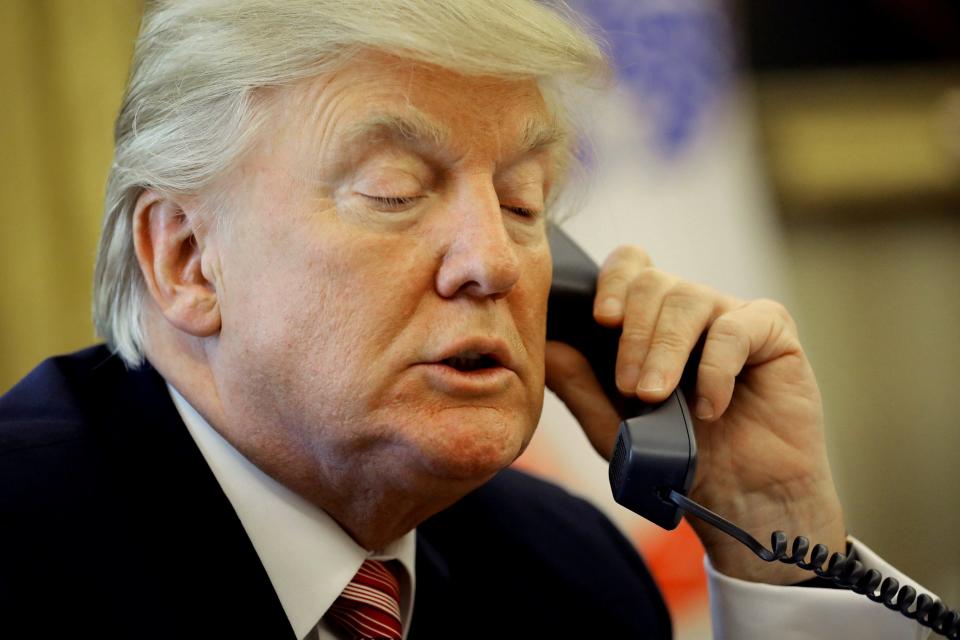
Trump says his 2017-18 phone logs were official-act evidence
The defense is poised to argue that the hush-money jury should never have seen phone logs showing when and for how long Cohen's phone connected with phones used by Trump.
But the logs are neither "acts" nor vital to a verdict, former prosecutors said.
"A phone record is not the president doing something," said Diana Florence, another former financial crimes prosecutor now in private practice.
"The logs only show that this instrument connected to that instrument," Moscow agreed.
"And if that's an official act, then that's a real problem," he added, meaning that any such interpretation of presidential immunity would be incredibly broad.
Still, "the conversation is what was important, and the fact of a conversation was confirmed by the person on the other end," meaning Cohen, who the verdict shows the jurors believed, Moscow said.
"So if you knock out the phone logs, that doesn't warrant a new trial."
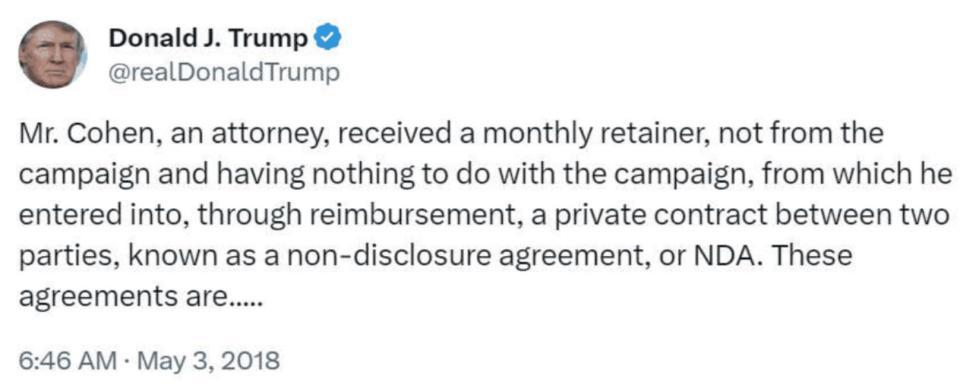
Trump says his 2018 tweets were official-act evidence
The hush-money jury should never have seen certain incriminating 2018 tweets, the defense is also ready to argue in seeking that 330.30 reversal.
In the tweets, Trump described his payments to Cohen as hush-money reimbursement, contrary to his business records, in which the payments were falsely — and 34 times — called "legal fees."
But the tweets were from Trump's personal Twitter account. They described payments from Trump's personal checkbook. And they concerned the most personal of allegations — a one-night-stand with a porn actor.
"And that's why it wasn't on the White House stationery," Florence joked. "President Donald J. Trump here, and I didn't pay that porn star."
"If tweets or 'truths' are all official acts, then the libel and defamation laws all go," added Moscow. "Privacy laws all go. He can say whatever he wants whenever he wants to."
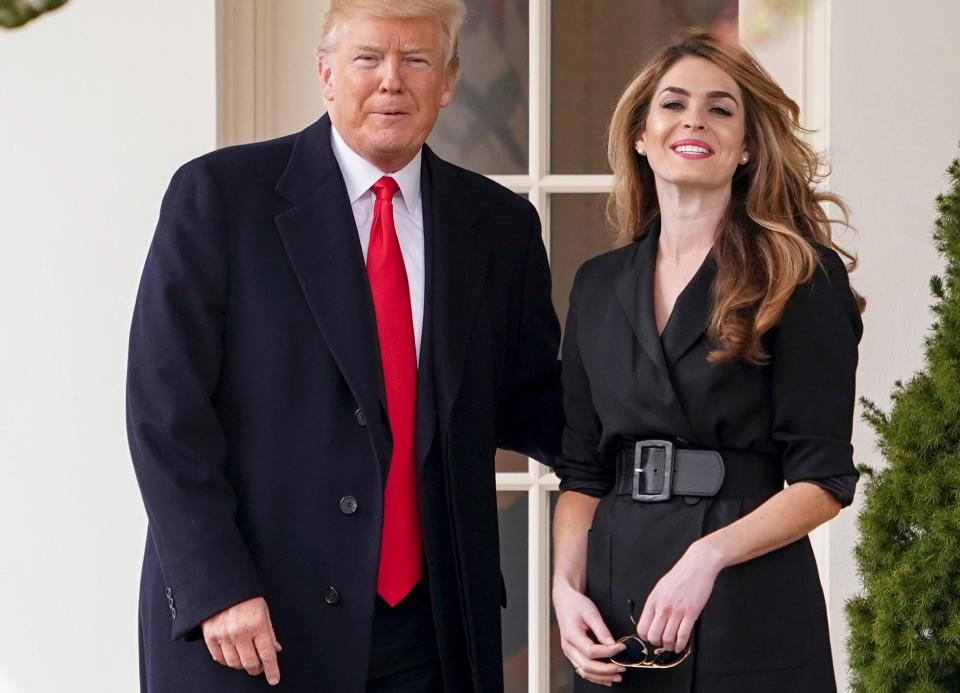
Trump says an Oval Office conversation with Hope Hicks was official-act evidence, too
The defense is also poised to argue that the jury should never have heard former White House communications director Hope Hicks testify about a 2018 Oval Office conversation, in which she said Trump told her he was relieved the hush-money story broke after the election, rather than before.
The testimony was "devastating" and showed Trump considered the hush-money payment to be vital to his campaign, prosecutor Joshua Steinglass told the jury in closing statements.
Florence thought this conversation might arguably be official under the SCOTUS opinion "because she worked for the administration."
The opinion says that in the DC insurrection case, Trump's discussions with his acting attorney general "are readily categorized in light of the nature of the President's official relationship to the office held by that individual" and are therefore immune from prosecution and cannot be used against him.
"But even then, he's talking with Hicks about something relating to his personal life," Florence added.
Either way — whether it was properly or improperly shared with the jury — the Hicks conversation is more corroborative than substantive, and the verdict would survive without it, Florence and Moscow agreed.

Finally, Trump says a 2018 government ethics form was also official-act evidence
The last piece of purportedly official-act evidence Trump is challenging is a government ethics form he signed in 2018.
The form details Trump's assets and liabilities and is mandatory for all presidents and high-level administration officials.
Prosecutors showed it to jurors because it includes Trump's claim that "Mr. Trump fully reimbursed Mr. Cohen in 2017." By calling it reimbursement, Trump contradicts his business records, which disguised the reimbursement as legal fees.
"The Supreme Court could not mean that the president is immune from filling out forms," Moscow said. "If that is an official act, then Trump has no liability for signing and approving any documents."
Said Florence, "If he was being prosecuted for that form — for that being a false filing — then maybe, maybe, in the new world we're living in then that could cause the verdict to be overturned.
"That's if the judge deemed it an official act, which it could be," she said. "But the thing is, it's only more corroboration."

No reversal necessary
Even without the phone logs, the tweets, the Hicks testimony, and the ethics form, there is more than enough non-official-act evidence to convict Trump, said Charles Solomon, who, before retiring, was a state Supreme Court justice in Manhattan for more than 30 years.
"Even if he had immunity from all of this evidence, that doesn't mean you throw out the whole verdict," said Solomon, who after leaving the bench worked as an advisor to the DA's office.
"I don't think there's anything appearing in the record requiring a reversal or modification of the verdict as a matter of law," he said.
"The question every judge is going to ask, and the then the appellate courts will ask too, is was the error of such significance that had it not been made, the verdict could well have been different," said attorney Thomas Franczyk.
"The judge will ask, 'even if we set that evidence aside, was there sufficient evidence left to still say 'no harm, no foul, there would have been a conviction anyway?'" said Franczyk, a retired state Supreme Court justice from Buffalo who has written about 330.30 motions for the Assigned Counsel Program of Erie County.
And if a 330.30 fails, it's straight to sentencing
If Merchan rejects the defense 330.30 motion, it's game over, at least on the trial-court level. Trump's sentencing will be the next, inevitable step, the retired judges and former prosecutors who spoke to BI agreed.
As a newly sentenced felon, Trump can immediately appeal — including on the grounds that official-act evidence was improperly admitted and that the 330.30 motion was improperly denied.
Trump's hush-money conviction appeal will take years and could even lead back to the US Supreme Court.
"I can write their opinion: 'It's Donald Trump, so he wins,'" Moscow joked. "With a concurring opinion by Justice Clarence 'My Buddies Won't Continue Funding Me If I Let His Conviction Stand' Thomas."
Any sentence will almost certainly be put on ice in its entirety pending the outcome of Trump's appeals, experts say.
Still, Trump will remain a convicted and sentenced felon for the duration. That's including — if the current September 18 sentencing date holds — as Americans head to the polls in November to choose their next president.
"Obviously, we're all speculating because who in the world ever thought that this is where we would ever be," said Florence.
"But I'm pretty sure there will be a sentencing," she said. "Maybe Judge Cannon would set the verdict aside," she said, referring to US District Judge Aileen Cannon, who presides over his Florida classified documents case.
"But I don't think a Judge Merchan will."
Prosecutors have called the 330.30 effort "without merit." They must file their response by July 24. Merchan has said he will issue a written decision on September 6. A DA spokesperson and a lawyer for Trump declined to comment on this story.
Read the original article on Business Insider

